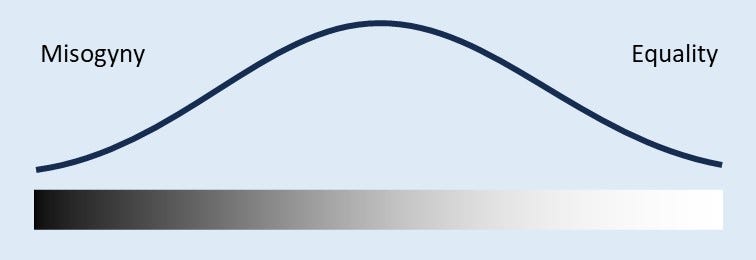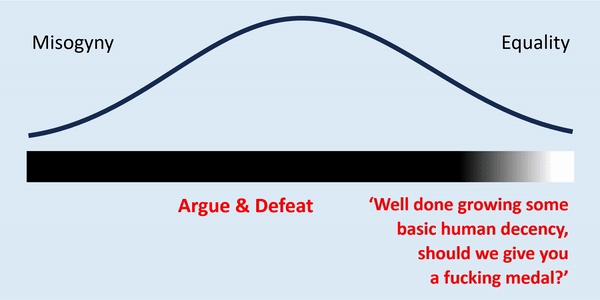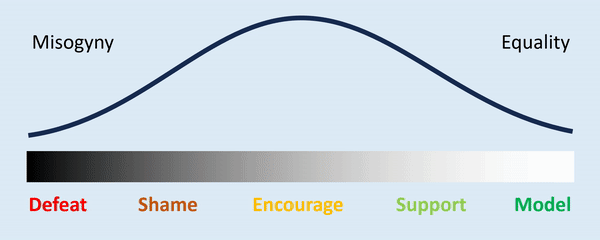All is not well in the world of gender equality.
Around the globe, reactionary movements are gaining ground, misogynist influencers are topping online searches, and identity politics, feminism and gender studies are increasingly seen as tiresome, annoying, and out of touch.
Whatever the proponents of equality are doing, it doesn’t work.
Perhaps it did work before, but something has changed. Maybe it’s because society is more polarised overall, the new media changed how we communicate, or the alt-right just upped their game. Either way, something is not working out for those who would like a more equal world.
And I think I know what .
One way to respond is to double down on what we’ve been doing with triple ferocity and call any critic a traitor.
Another is to ask what doesn’t work and try to figure out what does. Here is my attempt at just that.
The ideal and the real
In an ideal world, people are strongly motivated by moral principles and rational arguments. In an ideal world, all humans would be on board with gender equality just because it is the right thing to do and because there is no rational reason not to.
Needless to say, we do not live in an ideal world.
In the real world, people are motivated by a bunch of suspect principles, prioritise their own interests, are strongly impacted by emotions and great at using their supreme reason not to carefully evaluate rational arguments but to rationalise their emotions and desires.
In the real world, many people do not get on board with gender equality, or only do in words but not actions, or only do in some aspects that aren’t too inconvenient for them. It’s not just men — there are plenty of female conservatists, trad-wives, and so on. But cis-men are the majority.
Importantly, there is a whole spectrum of how on board with gender equality men are. Some think allowing women to vote is a mistake. Others might support equal rights but still want women to do all the housework. Some are on board with dividing it equally but want women to be sexually available. Yet others simply don’t get why some jokes aren’t so funny.
There are infinitely many ways this can play out, each one of them with infinite variations of intensity and likelihood to actually impact anyone. Some of them are really horrible, others less so, yet others are mostly quite inconsequential. It’s a greyscale.
I’ve not done the research, but I’d assume people’s commitment to equality follows a broadly normal distribution:

A human problem
There is nothing unique about gender equality or men as a group in this respect. The same applies to many other issues.
White people might be on board with civil rights for other ethnicities but be ambivalent about using disproportional police force against them. They might be vocally defending #BlackLivesMatter but not volunteer a second or a penny to it. They might volunteer but do so with benevolent racism.
Able-bodied people can introduce fair hiring practices in their company but not like their taxes being spent on accessibility. Straight people can have nothing against gays but be swayed by an anti-trans scare around toilet use. Middle-class woke people might speak all the right words about social justice, but still send their kids to private schools and deride those who express their frustration at being left behind by voting for Trump or Brexit.
The list goes on and on. Humans are absolutely stellar at being inconsistent about their beliefs, cherry-picking the bits they like and rationalising away the rest, and seeing a problem with everyone but themselves.
The point is that as much as we might wish we lived in an ideal world in which people do what’s right out of sheer moral motivation with no care for selfish interests and never succumbing to the weakness of will — we just don’t.
We live in a very messy, non-ideal world.
Stuck on principle
I think that failure to acknowledge that is partially responsible for the stalled progress towards gender equality. I see a lot of people screaming:
I WANT TO LIVE IN THE IDEAL WORLD, NOW!
WHY AREN’T YOU ALL IDEAL?!
It’s hard not to sympathise. Why would anyone want to live in a world which treats them unfairly for a second longer? I was born priviledged on most counts yet even I am tired of how unfair the world is!
And I realise how, being so privileged, I can sound like an insensitive ass when I say that demanding an ideal world now cannot be our only or even main strategy. Of course, it’s easy for me to say — I don’t feel the same urgency. But this doesn’t make it any less true.
Social change is never fast and easy, not even at a personal scale. Just try it out. Go to your partner who I assume is — like any human — not ideal, and start reminding them every day about their every flaw and how you expect them to change right now into the person you deserve.
Add unwillingness to understand their limitations or background and sprinkle with some holy sanctimony (because obviously, you have no similar flaws at all). See how long they’ll be your partner.
Seems like a recipe for disaster? Yet this is pretty much what I think is happening on the societal level right now.
This is just not how humans work. A zero-tolerance for anything that’s not ideal is too much for any humans who are not ideal — that is, all humans. It just pushes them away.
And I know exactly how it feels because I’ve been on the receiving end of that treatment many times. I regularly ask myself: are they trying to turn me against equality? Are they pushing me away on purpose? Do they want me to hate them and everything they stand for?
I am really sorry you’re hearing this from my privileged ass, but it’s just as true regardless of who says it.
In extreme cases, this approach effectively divides people into perfect and horrible and is blind to the actual greyscale of options. It might not be completely black-and-white, but it’s pretty damn skewed.
Its strategy is to argue against and destroy anything that’s not ideal, and even for those who reach the ideal, it has little positive to say:

This is a caricature, of course. Probably few people actually use this strategy in such an extreme. But many err towards it. As a rule of thumb, stuff which seems closer to it should make us think: perhaps that’s not the best way to get us where we want to be.
And I cannot stress enough how perfectly psychologically understandable it is, given how tired and angry people are with the discrimination they experience. I cannot possibly fathom their pain.
But being tired and angry doesn’t make it right.
Getting pragmatic
While it is important to push for the ideal, I worry that much of the principled criticism of all that falls short of it is quite like solving personal problems with alcohol or chocolate. I get why people do it and how it makes them feel better at the time, but it only makes things worse in the long run.
And 131 years is a pretty long run already — because this is how long the World Economic Forum predicts it will take to close the world gender gap at the current pace.
Instead of stalling it further, I think we should acknowledge the world’s imperfection and adopt a more pragmatic and utilitarian approach:
The best thing to do is the thing that works and delivers as much good as quickly as possible.
Thus, the right way to make people embrace gender equality is the one that gets as many people on board as quickly as possible.
Unless we’re happy to wait 131 years, I think we should roll up our sleeves and do what works to speed this up.
Targeted approach
The best way to get to gender equality quicker is to be more nuanced at reaching people at different points on the grayscale spectrum. In particular, we need to become better at reaching those who are in the lighter ranges.
Here’s a picture to illustrate what I mean:

Defeat
We absolutely need to fight committed misogynists and defeat them. That’s just the most effective strategy. They won’t ever change and even if they could, the effort is just not worth it. Meanwhile, an all-out fight sends a clear message that what they stand for is completely unacceptable.
But then, there is everybody else.
Psychology teaches us that the most effective way to change someone’s mind is not to present them with rational arguments or beat false beliefs out of them. It’s to appeal to their emotions and offer empathetic encouragement.
Shame
If you need a poignant example of why arguing doesn’t work, remember that to millions of guys it’s just a game: they get points for triggering a feminist and destroying the woke brigade. They might not even care much about the topic, it’s just a way to get social cred and climb the lobster ladder.
There are better ways to discourage them than arguing. Men hate looking stupid and losing status, so if supporting misogynist narratives can be made into something shameful and weak, they’ll be less likely to do it.
Right now, being in that dark space on the spectrum and arguing makes men feel strong and cool. Instead, we need to find ways to make it feel pathetic and laughable.
Encourage and support
The encouragement and support for those who are in the middle should be our top priority, as they are the swing voters likely to move towards the side which makes them feel welcome and offers them positive reinforcement.
I think that they are absolutely vital in the struggle for gender equality, yet are mostly forgotten. No wonder — they just aren’t that exciting. They rarely spew hate or hurt others. Their transgressions are relatively minor. They’re guilty mainly of laziness, apathy, and ignorance. No great drama.
Attacking and arguing with them is only likely to push them away and give the true misogynists recruitment opportunities: See? I told you they are vicious! And over what, it’s not like you’ve even done anything that bad. I get comments like that — I’m not going to fall for them, but how many will?
For these guys, carrots will work much better than sticks. Thy need to be told what they’re doing right, not just what they’re doing wrong. They need to be given exciting opportunities to improve, positive role models, a chance to earn gratitude.
Forgetting about them is the biggest mistake of equality movements. These people could easily be great allies. Instead, they’re given the WHY AREN’T YOU IDEAL YET?! treatment and end up drifting towards those who make them feel welcome: the alt-right.
Model
Finally, men who did the hard work, developed the emotional maturity they weren’t taught, challenged the social narratives they were brought up with, and got out of the lobster race — they need to be shown as examples and given a platform through which to reach others.
They should try to become role models other men can look up to.
This isn’t about handing out golden stars and back-patting. Instead, it’s pragmatic — it sends a positive signal to those who are not yet there.
We should encourage men like this to speak because other guys are way more likely to listen to them than to women. Again, that sucks and it shouldn’t be so in the ideal world, but that’s where we are.
The worst thing to do with those guys is to snigger at them for ‘achieving basic human decency’ while sanctimoniously pointing out all their tiniest mistakes. All those men who should be looking up to them will see and think: wait *that’s* what I’m doing all this hard work for?
Moving forward
As I said, all is not good in the world of gender equality. Whatever it is we’re doing, it is backfiring. We need new strategies. I am proposing one idea painted in very broad strokes. It doesn’t have to be right. It’s a suggestion open to criticism and improvement, but it’s a move forward.
Because I think is pretty clear that we can’t keep doing what doesn’t work and accuse those who question it of high treason. I think that anyone who does that risks shooting themselves — and gender equality — in the foot.
Do you think we should adopt the more targeted approach I am suggesting? In what ways could we improve it? How can we best reach the people in the middle?
Wait.
Who is ‘we’?
It is all of us who see this problem and want to correct it. It’s all who don’t want to wait 131 years. It’s anyone who feels they are in the brighter half of the spectrum and wants to help those in the darker half.
It is all who would rather spend less energy on complaining how crap things are and more on making them better.
This ‘we’ has no gender. It’s just people who want to make the world better for everyone.


